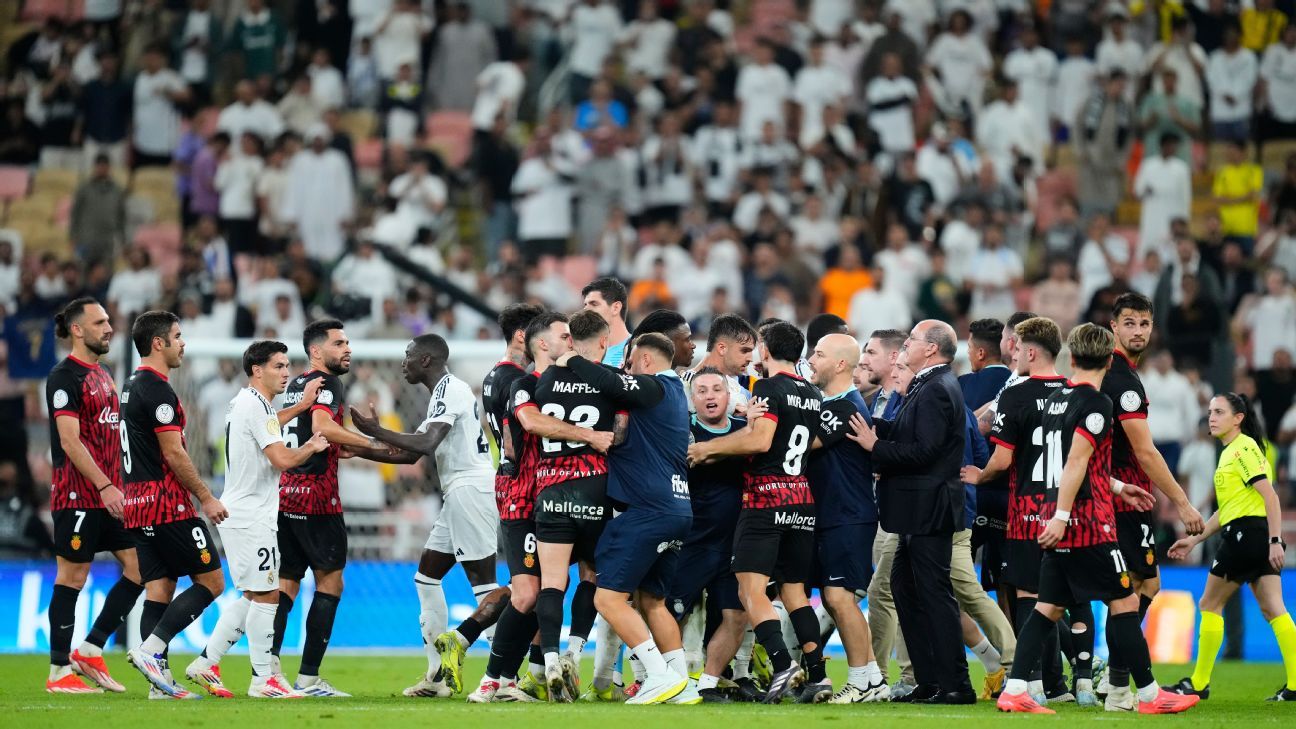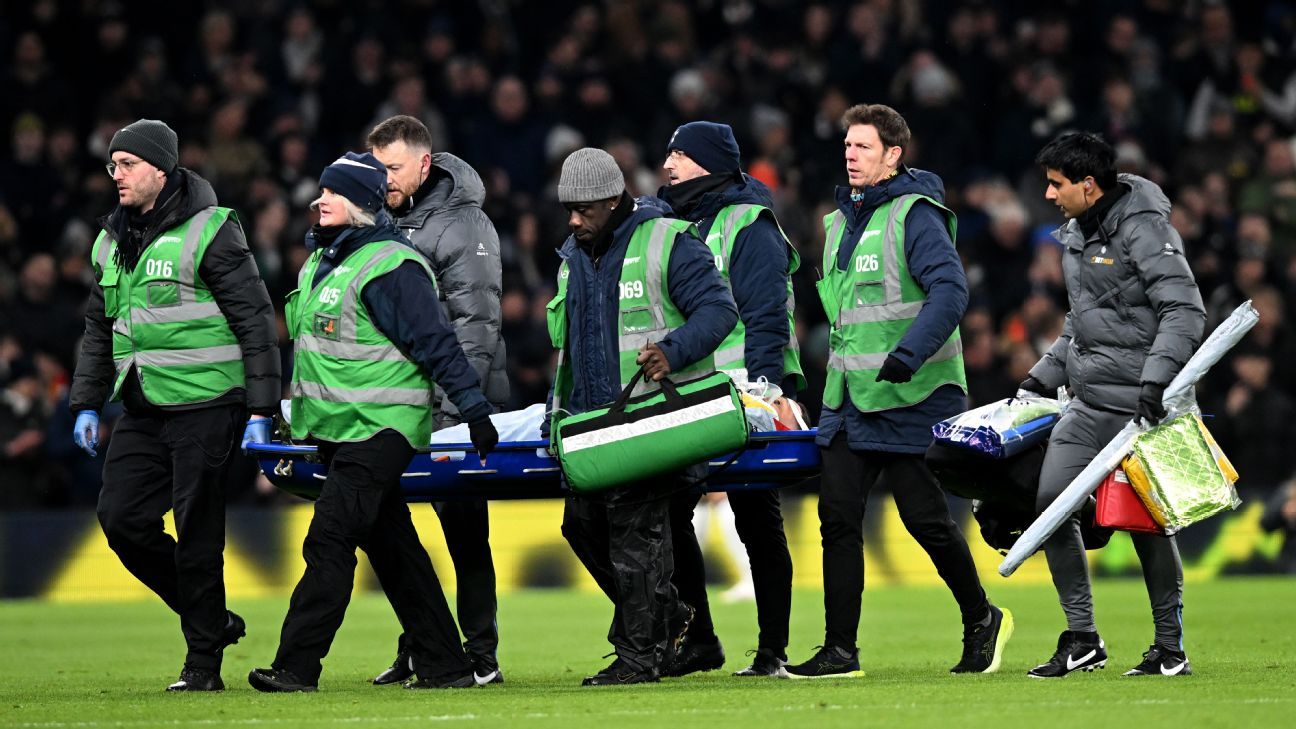
Mark Ogden, Senior Writer, ESPN FCJul 5, 2024, 09:46 PM
STUTTGART, Germany -- For a player who has made a career out of being the master of calm, Toni Kroos would never have expected it all to end in chaos, but after 833 games for club and country, the final act of the Germany midfielder's career was played out in a frenzy of fouls, missed chances, dramatic late goals, rejected penalty appeals and a referee who issued 16 yellow cards and one red.
Germany's dream of winning Euro 2024 as host nation came to a bitter end in Stuttgart on Friday as Mikel Merino's 119th-minute header sealed a 2-1 quarterfinal win for Spain. Luis de la Fuente's team march on and will play a semifinal in Munich on Tuesday, but it is the end of the road for Germany and also for Kroos, the Real Madrid midfielder who had hoped to bring the curtain down on his international career just as he did his club days with Real by signing off as a European champion.
But those are merely the bare facts of an incredible 120 minutes that proved to be so uncharacteristic for Kroos and Germany, with Premier League referee Anthony Taylor and his VAR colleagues playing no small part in the drama. Had Taylor been more decisive in the fourth minute, when he failed to book Kroos for a cynical foul on Pedri that led to the Spain midfielder limping out of the game moments later, the tone of this unforgettable game could have been so different.
By failing to crack down on a bad foul so early in the tie, though Taylor allowed Germany to play out their gameplan of physical intimidation that clearly knocked Spain off their stride throughout the first half. Maybe Taylor had chosen to give Kroos the benefit of the doubt due to his reputation as a world-class player, one who has enjoyed a distinguished career, but the referee simply gave the 34-year-old and his teammates the licence to rough Spain up.
Germany played in fear of Spain's greater quality and flair with the ball, while De la Fuente's players were affected by another kind of fear -- the fear of being whacked every time they went close to a German opponent.
"Lamine Yamal is only 16 years old, which means our players have a great chance to control him," Germany coach Julian Nagelsmann said in his pre-match news conference. "We'll see how he reacts when things get more difficult."
His post-match message was no different and unrepentant.
"We started nervously, made too many fouls, too many yellow cards too early," Nagelsmann said after the match. "Nonetheless it was good, we wanted to send [a] sign that we were present."
So the tactic was clear and Kroos was the leader of the German pack, which was so jarring to see. By the end of the game, he had committed five fouls -- three more than any other offender. He should have been booked for the foul on Pedri, long before he was eventually yellow carded halfway through the second half for halting Dani Olmo's run on goal. Had there not been a covering defender, Kroos could have been sent off. What an ending that would have been.
It wasn't just Kroos, though. Antonio Rüdiger, David Raum and Robert Andrich were booked for fouls on Spain's young forwards and Germany ended up with eight yellow cards. And so did Spain, who decided to fight fire with fire in the second half after their first-half experience. Robin Le Normand's booking rules him out of the semifinal, while Dani Carvajal will also miss out after two yellow cards, the second of which was for wrestling Jamal Musiala to the ground in extra-time.
In some ways, Nagelsmann's decision to make it a physical game was understandable. Spain have been the outstanding team of this tournament so far and he felt that the only way to win was to outmuscle them.
It was a flawed tactic, though, especially with the talent of Kroos and Musiala at his disposal. Florian Wirtz, whose 89th-minute goal cancelled out Olmo's opener, was only named as a substitute, and that decision summed up Nagelsmann's approach.
Wirtz would start every game for Spain, and that is difference between the two teams, but even the Bayer Leverkusen midfielder was bitten by the cynical bug. Ten seconds after entering the game, he fouled Aymeric Laporte.
Maybe this was the day when Nagelsmann's Germany showed their true colours as a team with dazzling young talent but also one that had been over-reliant on the performances of their ageing veterans. Germany were fortunate to draw against Switzerland, and Spain were better than the Swiss, so the wins against Scotland, Hungary and Denmark were merely victories against weaker opponents.
We know that this was the final farewell for Kroos, but Rüdiger (31), Manuel Neuer (38), Ilkay Gündogan (33) and Thomas Müller (34) are likely to follow him into international retirement. Even Emre Can, at 30, may find himself consigned to the past if Nagelsmann starts to rebuild ahead of the 2026 World Cup.
"I don't even know what the plan is now because I didn't plan on being eliminated," Nagelsmann said. "My team and I have the job of thinking about the squad now and what is the right thing to do in the Nations League in September."
Perhaps Nagelsmann didn't believe he could take on Spain in a football match, opting instead to deploy underdog tactics. Germany are rarely the underdogs, though, especially when they are the host nation of a major tournament.
Taylor's initial leniency allowed Germany to take their basic approach until he began to flourish his cards. If only Kroos had been able to influence the team to play a different way, one more suited to his role as a conductor at the base of midfield with his incredible passing range and vision. Instead, he was a destroyer and a disruptor.
By the time Germany changed their tactics and engaged Spain in a game of football late in the second half, the match had become a free-for-all. It was end-to-end and totally unpredictable.
When the ball hit Marc Cucurella's hand in the 106th minute, Germany screamed for a penalty but VAR Stuart Attwell -- the same official who suggested a penalty for Germany against Denmark when the ball brushed Joachim Andersen's fingers -- rejected the appeals. A penalty shootout seemed inevitable as the game drifted toward the 120th minute, but Merino's header from Olmo's cross settled the tie with a minute to go.
With that, Germany were out and the curtain had fallen on Kroos's outstanding career, but not in a way that anyone would have expected.
 (1).png)
 6 months ago
22
6 months ago
22


















